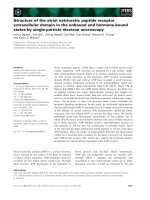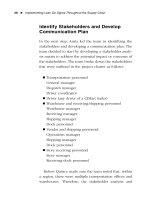Anecdotes of the Habits and Instinct of Animals, by R. Lee potx
Bạn đang xem bản rút gọn của tài liệu. Xem và tải ngay bản đầy đủ của tài liệu tại đây (2.31 MB, 891 trang )
The Project Gutenberg EBook of Anecdotes
of the Habits and Instinct of
Animals, by R. Lee
This eBook is for the use of anyone
anywhere at no cost and with
almost no restrictions whatsoever. You may
copy it, give it away or
re-use it under the terms of the Project
Gutenberg License included
with this eBook or online at
www.gutenberg.org
Title: Anecdotes of the Habits and
Instinct of Animals
Author: R. Lee
Illustrator: Harrison Weir
Release Date: June 30, 2007 [EBook #21973]
Language: English
*** START OF THIS PROJECT GUTENBERG EBOOK
HABITS AND INSTINCT OF ANIMALS ***
Produced by David Edwards, Marcia Brooks
and the Online
Distributed Proofreading Team at
(This
file was produced from images generously
made available
by The University of Florida, The Internet
Archive/Children's Library)
ANECDOTES
OF
THE HABITS
AND INSTINCT
OF ANIMALS.
Signed Copy
The Monkey Painter—Page 7.
BY MRS. R. LEE,
FORMERLY MRS. T. E. BOWDICH,
AUTHOR OF "THE AFRICAN WANDERERS,"
"ADVENTURES IN AUSTRALIA,"
"MEMOIRS OF CUVIER," ETC.
WITH
ILLUSTRATIONS BY HARRISON
WEIR.
LONDON:
GRANT AND GRIFFITH,
SUCCESSORS TO J. HARRIS,
CORNER OF ST. PAUL'S
CHURCHYARD.
M.DCCC.LII.
LONDON:
PRINTED BY J. WERTHEIMER AND
CO.,
CIRCUS PLACE, FINSBURY.
PREFACE.
In making a selection of anecdotes, those
have been assembled which were
supplied by me to other works, and in
most instances have received
considerable amplification; others have
been given which never before were
printed—perhaps not even written; while
all which have been transferred from other
pages to mine have received the stamp of
authenticity. Besides those whose names
are already mentioned, I have to thank
several friends who have drawn from
their private stores for my advantage, and
thus enabled me to offer much that is
perfectly new.
Dry details of science and classification
have been laid aside, but a certain order
has been kept to avoid confusion; and,
although endeavours have been made to
throw as much interest as possible over
these recorded habits and actions of the
brute creation; I love the latter too well to
raise a doubt by one word of
embellishment, even if I did not abstain
from principle.
The intentions with which this work was
commenced have not been carried out,
inasmuch as materials have crowded upon
me beyond all calculation; and, although a
large portion has been rejected, the
anecdotes related go no farther than the
Mammalia, while almost all animals were
to have been included.
With regard to the remaining orders—if
the present work should meet with a
favourable reception, I shall hope next
year to present the public with touching
and amusing proofs of the sagacity and
dispositions of birds, and of "hair-breadth
scapes" from reptiles, etc., some of which
will, like those in the present volume, be
carefully selected from the works of
travellers, from the resources of friends,
and from my own experience.
To the pleasing task of enlightening those,
who, shut up in close cities, have no
opportunity of observing for themselves,
and to the still higher enjoyment of
directing young minds to an elevating
pursuit, the naturalist adds a gratification
even better than all, by making known the
hidden wonders of nature; and leaving to
those who delight in argument, the ever
unsolved question of where instinct ends
and reason begins, he sets forth the love of
the great Creator towards all His
creatures, and the ways He takes to show
His wisdom.
CONTENTS.
PREFACE.
ILLUSTRATIONS
MONKEYS, ETC.
BATS.
MOLES.
HEDGEHOGS.
BEARS.
BADGERS.
WEASELS.
OTTERS.
DOGS.
PAGE
1
33
41
47
51
66
73
78
83
WOLVES.
FOXES.
HYÆNAS.
LIONS.
TIGERS.
LEOPARDS, PANTHERS,
ETC.
CATS.
SQUIRRELS.
RATS.
MICE.
ELEPHANTS.
HIPPOPOTAMUS.
HOGS.
RHINOCEROSES.
162
174
180
186
213
224
237
250
254
266
271
294
297
307
HORSES.
THE ASS.
CAMELS.—DROMEDARIES.
LLAMAS, etc.
DEER.
GIRAFFES.
ANTELOPES.
GOATS.
SHEEP.
OXEN.
312
333
339
344
347
354
358
363
368
373
ILLUSTRATIONS
ANECDOTES OF
The Monkey Painter
The Bear and her Cubs
The Shepard Dog and Cur
The Fox and the Hares
Leading the Blind Rat
Wild Horses and Wolves
Frontis
54
102
176
261
330
ANIMALS.
THE QUADRUMANA,
OR MONKEY TRIBE.
Formed like man, and practicing similar
gestures, but with thumbs instead of great
toes upon their feet, and with so narrow a
heel-bone, that even those who constantly
walk upright have not the firm and
dignified step of human beings; the
Quadrumana yet approximate so closely to
us, that they demand the first place in a
book devoted principally to the
intellectual (whether it be reason or
instinct) history of animals. This
approximation is a matter of amusement to
some; but to the larger portion of mankind,
I should say, it is a source of disgust.
"Rapoynda," I exclaimed, one day, to a
troublesome, inquisitive, restless negro,
pointing to a black monkey, which much
resembled him in character, "that is your
brother." Never shall I forget the
malignant scowl which passed over the
man's features at my heedless comparison.
No apology, no kindness, not even the gift
of a smart waistcoat, which he greatly
coveted, ever restored me to his good
graces; and I was not sorry when his Chief
summoned him from my vicinity, for I
dreaded his revenge.
A few years after, I stood lost in
admiration before Sir Edwin Landseer's
inimitable picture of "the monkey who had
seen the world," in which nature and truth
lend their tone and force to the highest
efforts of art; when a voice exclaimed,
"How can you waste your time looking at
that thing; such creatures ought never to
have been painted;" and although the
speaker was a religious man, he muttered
to himself, "I am not sure they ought ever
to have been made." The voice proceeded
from one of the finest instances of manly
beauty; one famed also for talent and
acquirement. Rapoynda started into my
recollection; and as I slowly left the
talented picture, I could not help smiling
at the common feeling between the savage
and the gentleman, thereby proving its
universality.
Never did any one start for a tropical
climate with a greater antipathy towards
these "wild men" than I did; I lived years
in their vicinity and yet contrived to avoid
all contact with them, and it was not till I
was homeward-bound that my conversion
was effected. The ship in which Mr.
Bowdich and myself took a round-about
course to England, was floating on a wide
expanse of water, disturbed only by the
heavy swell, which forms the sole motion
in a calm; the watch on deck were seated
near the bows of the vessel, the
passengers and officers were almost all
below, there was only myself and the
helmsman on the after-deck; he stood
listlessly by the binnacle, and I was
wholly occupied in reading. A noise
between a squeak and a chatter suddenly
met my ears; and before I could turn my
head to see whence it proceeded, a heavy,
living creature jumped on to my shoulders
from behind, and its tail encircled my
throat. I felt it was Jack, the cook's
monkey; the mischievous, malicious,
mocking, but inimitable Jack, whose
pranks had often made me laugh against
my will, as I watched him from a distance,
but with whom I had never made the least
acquaintance. Whether from fear or
presence of mind I do not pretend to say,
but I remained perfectly still, and in a
minute or two Jack put his head forward
and stared me in the face, uttering a sort of
croak; he then descended on to my knees,
examined my hands as if he were counting
my fingers, tried to take off my rings, and
when I gave him some biscuit, curled
himself compactly into my lap. We were
friends from that moment. My aversion
thus cured, I have ever since felt
indescribable interest and entertainment in
watching, studying, and protecting
monkeys. We had several on board the
above-mentioned vessel, but Jack was the
prince of them all.
Exclusively belonging to the cook,
although a favourite with the whole crew,
my friend (a Cercopithecus from Senegal)
had been at first kept by means of a cord,
attached to the caboose; but, as he became
more and more tame, his liberty was
extended, till at last he was allowed the
whole range of the ship, with the
exception of the captain's and passengers'
cabins. The occupations which he marked
out for himself began at early dawn, by
overturning the steward's parrot-cage
whenever he could get at it, in order to
secure the lump of sugar which then rolled
out, or lick up the water which ran from
the upset cup; he evidently intended to pull
the parrot's feathers, but the latter, by
turning round as fast as Jack turned,
always faced him, and his beak was too
formidable to be encountered. I was
frequently awakened by the quick
trampling of feet at this early hour, and
knew it arose from a pursuit of Jack, in
consequence of some mischief on his part.
Like all other nautical monkeys, he
descended into the forecastle, where he
twisted off the night-caps of the sailors as
they lay in their hammocks, stole their
knives, tools, etc., and if they were not
very active in the pursuit, these
purloinings were thrown overboard.
When the preparations for breakfast
began, Jack took his post in a corner near
the grate, and when the cook's back was
turned, hooked out the pieces of biscuit
which were toasting between the bars for
the men, and snatched the bunches of dried
herbs, with which they tried to imitate tea,
out of the tin mugs. He sometimes scalded
or burnt his fingers by these tricks, which
kept him quiet for a few days; but no
sooner was the pain gone than he repeated
the mischief.
Two days in each week, the pigs, which
formed part of our live stock, were
allowed to run about the deck for
exercise, and then Jack was particularly
happy: hiding himself behind a cask, he
would suddenly spring on to the back of
one of them, his face to the tail, and away
scampered his frightened steed.
Sometimes an obstacle would impede the
gallop, and then Jack, loosening the hold
which he had acquired by digging his nails
into the skin of the pig, industriously tried
to uncurl its tail, and if he were saluted by
a laugh from some one near by, he would
look up with an assumed air of wonder, as
much as to say; What can you find to laugh
at? When the pigs were shut up, he thought
it his turn to give others a ride, and there
were three little monkeys, with red skins
and blue faces, whom he particularly
favored: I frequently met him with all of
them on his back at the same time,
squeaking and huddling together, and with
difficulty preserving their seat; when he
suddenly stopped, and seemed to ask me









